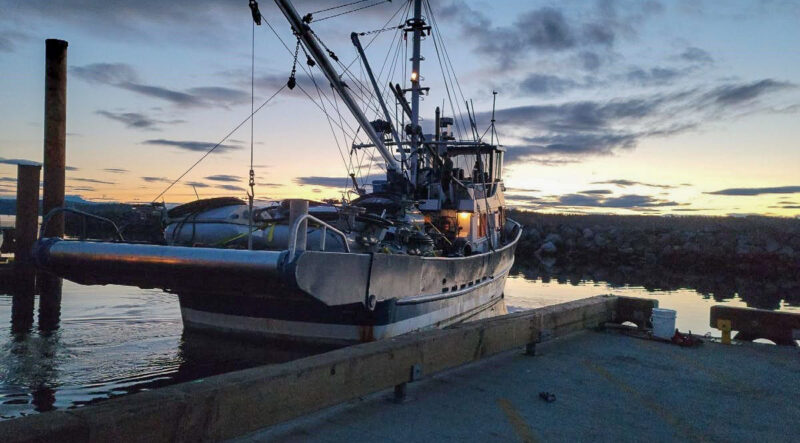Net gains from aquaculture for First Nations businesses
“In the past 20 years I’ve advocated for aquaculture and believed in it even when others spoke down to it” – Richard Harry, a member of the Homalco First Nation.
By Fabian Dawson
SeaWestNews
Life for Richard Harry, a member of the Homalco First Nation on Vancouver Island, has always been linked to the waters of British Columbia.
“The water is what I know,” said the former chief of the Homalco, known as the ‘People of Turbulent Waters’.
“For myself and my family, we have always worked on the water,” he said.
“We’ve always been a commercial fishing family and the children pretty much grew up on our boats, so it’s been a lifetime of experience.”
This week, Harry’s bond with the seas of his traditional territory, resulted in another gain for his family and his people.
His company – R Harry Fishing Ltd. – signed a net-washing contract with Grieg Seafood BC to service five salmon farms in BC’s Nootka Sound.
Harry is currently refitting his commercial fishing vessel into a net-washing workboat, one that will also house his workers on board. He has also purchased three automated net washing machines to service Grieg’s farms in Nootka Sound.
“In the past 20 years I’ve advocated for aquaculture and believed in it even when others spoke down to it. We see lots of change with the industry and First Nations going forward, and I’ve been a part of that for a long time,” said Harry, a founding member of the Aboriginal Aquaculture Association (AAA)
“This kind of partnership that we’re establishing today can be a model for that. I’m very proud to be a participant of this arrangement, my family looks forward to it, and I’m very thankful for it.”
This is the second net-washing agreement between Grieg and a local Indigenous enterprise so far this year, after the Tlowitsis Nation’s business Chief’s Pride Aquaculture Corp. signed a similar contract with Grieg in June to service salmon farms in their traditional territory of Clio Channel.
“Grieg wants to find opportunities not only for our First Nations partners, but First Nations businesses to be able to succeed, and this is an example of that – breaking down what would normally be a big contract granted to one business into regions for different Nations or Indigenous businesses to be involved,” said Rocky Boschman, Managing Director of Grieg Seafood BC.
“I know Richard is very entrepreneurial and progressive in his thinking. He’s a leader in his community, and he cares a lot about his family and the community at large,” said Boschman.
“At the end of the day, he is an innovative thinker who is looking to create local economic opportunity and support the responsible farming of a low-carbon protein. We’re really happy that he’s involved with us formally.”
Earlier this month, Greig in partnership with the Tlowitsis First Nation applied for an additional salmon farm licence in the Clio Channel, near the Discovery Islands, where federal fisheries minister Bernadette Jordan has ordered the closure of salmon aquaculture marine operations at the behest of anti-fish farming activists.
“Adding more farms in our territory is the clear way forward,’ said Chief John Smith of the Tlowitsis First Nation.
“Our Guardians are on the water monitoring the farm activities as well as our members employed by Grieg. We have taken a lot of time to learn about the industry and our partner before we decided to become involved more directly and for us, adding more farms in our territory is the clear way forward. Our net-wash service company will also benefit from additional work for our members at a new farm.”
The Tlowitsis Nation, comprising 450 registered members, already has a net-cleaning agreement for three salmon farms operated by Grieg Seafood BC in the Clio Channel.
Grieg now operates 22 farms off Vancouver Island and the Sunshine Coast which are licensed to produce 23,400 tonnes of salmon for North American and Asian markets.
Twenty BC First Nations have partnership agreements for farming salmon in their territories resulting in 80% of all salmon farmed in the province falling under a beneficial partnership with a First Nation.
Among them is the Kitasoo/Xai’Xais First Nation which has an agreement with Mowi Canada West for economic development and employment centred around salmon farming and processing in Klemtu, British Columbia.
The Kitasoo/Xai’Xais began farming and processing salmon since the late 1980’s, forming a partnership for the business with Mowi in 1998.
Another First Nations-owned business is the James Walkus Fishing Company which serves the aquaculture industry with an armada of boats that employs about 50 people in Port Hardy.
“Sustainable aquaculture is key for our wild fish to thrive…The employment it creates for many of our First Nations and other Canadians is important,” said James Walkus an elder of Gwa’sala-‘Nakwaxda’xw Nation.
“We need it, British Columbia needs it, the world needs it. If we don’t do it some other country will and it will be our loss and some other country’s gain,” Walkus, told SeaWestNews in an earlier interview.
“The aquaculture industry has been tremendous for me, my family and my community…there are a lot of us First Nations that are for aquaculture,” he said.
CAPT: Image shows Richard Harry’s commercial fishing boat which is being refitted into a net-washing vessel – Courtesy Greig Seafood BC.

